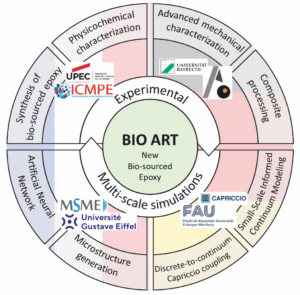INTRODUCTION
The development of bioplastics, particularly epoxies, sourced entirely from renewable plant-based materials marks a significant advancement in sustainable materials. These bioplastics offer a promising alternative to traditional petroleum-based plastics, reducing dependency on finite resources and minimizing environmental impact.
METHOD
Furthermore, these plant-based epoxies can be utilized to manufacture fiber composites, expanding their applications across various industries while promoting eco-friendly practices. This innovation represents a crucial step towards achieving a more sustainable future by fostering the creation of renewable materials that can effectively replace conventional plastics in numerous applications.
RESULT
This innovation represents a crucial step towards achieving a more sustainable future by fostering the creation of renewable materials that can effectively replace conventional plastics in numerous applications.
BLOG
-
Events
BioArt is often ludicrous. It can be lumpy, gross, unsanitary, sometimes invisible, and tricky to keep still on the auction block. But at the…
-
Sebastian’s first BIO ART post
It is great pleasure to put this first post here! BioArt is often intended to highlight themes and beauty in biological subjects, address or…
-
First post
The concept of transgenic art (transgenic art) was coined in 1998 by Eduardo Kac and refers to an art form “which works with genetic…




